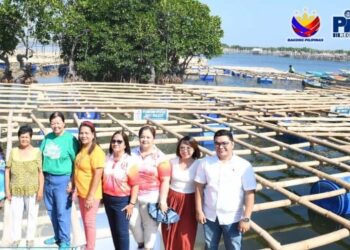A mother’s love knows no bounds. A mother will do everything for her child no matter what it takes to ensure their future. But what about a child for his mother? How much can a child sacrifice to show his love?
Mr. Ryan Mark Dunuan Ablao from Lamut, Ifugao, knows this all too well, as his love for his ailing mother sparked his journey in agriculture.
Originally working in Manila, he came back home to Ifugao to accompany and take care of his mother who was diagnosed with end-stage renal disease. He is grateful that they have available lands for food production but challenged at the same time as he and his family were not born farmers. Thus, he literally started from scratch.
Bridging the GAP through love
Far from the fast-paced life in Manila, Mr. Ablao trudged the path of agriculture and started farming in 2007. Aside from making the land productive again, his ultimate goal is to support her mother’s weekly dialysis and other needs.
It was difficult at first noting that he did not have sufficient knowledge of farming but through the help of farmworkers, his farming activities pushed through. Mr. Ablao’s desire to farm is further fueled by his determination to produce safer and healthier food as he acknowledges the fact that food is contributory to his mother’s unwanted condition. So when the Good Agricultural Practices (GAP) Program was introduced to him in 2020, he wholeheartedly showed interest in adopting it. Since then, he started to heavily promote and advocate food safety not only in his community but in other areas of Ifugao as well.
A GAP practitioner and advocate
Mr. Ablao gained his GAP certification in 2020 for his one-hectare farm dubbed as ‘Payawan Farms’. His certification covered various crops namely strawberry, soybeans, and papaya. This was renewed and granted re-certification in January 2024 with the scope of bell pepper, squash, and pechay. Currently, he is looking into crop programming as he is also practicing crop rotation.
Even before his certification, Mr. Ablao is already practicing GAP. He also attended GAP-related trainings to equip himself and his farmworkers to further develop his farm. He emphasized the proper use of chemical inputs to prevent soil damage. He also stressed the importance of record-keeping for traceability and other benefits of adopting GAP.
“When we adopted GAP, we saw the difference in our farming practices. First, our conscience became clearer that we are selling safer produce. Second, we were taught about the importance of our safety as farmers, and third was the preservation of our soils,” Mr. Ablao shared. Knowing that the crops are produced from a GAP-certified farm, Mr. Ablao admitted that they can sell these at higher prices. He is selling his harvest at wholesale price in the Lamut local market and the Nueva Vizcaya Agricultural Terminal (NVAT) in Bambang, Nueva Vizcaya.
Practicing GAP, for him, is valuable because the land being tilled at present will be passed on to the next generation. He strongly stressed that more than the land itself being inherited, are the problems attached to it which may only let the future generation suffer if no resolution is made at present.
“We must realize that there are ways to conserve and preserve our soils. As to the value of our crops, the production cost is reduced because of lesser use of pesticides while the price of the crops increased because of its higher quality,” he said.
Aside from the three (3) on-call farmworkers, he also took under his wings four (4) agriculture students enrolled in the Ifugao State University-Lamut campus. True to his advocacy, he specifically trains them on GAP farming while providing them with free lodging and meals. He also gave them commissions during harvest season, on condition that they must learn and internalize GAP “so that they can enjoy what they are doing and will have the drive and motivation to continue agriculture.”
Overcoming Challenges
Mr. Ablao recognized the difficulty of steering farmworkers away from their traditional farming methods, particularly in reducing chemical and fertilizer use. He mentioned his practice of fertilizer dilution by carefully measuring and weighing both the fertilizer and water before mixing them. He provides the farmworkers with the formula so they can do it by themselves. He further instills that farming is science, thus, following the appropriate formulas and processes, particularly for GAP, is crucial. “Over time, they got used to my practice and saw the significant difference between their old practice and GAP,” remarked Mr. Ablao.
Advocating GAP in the province is admittedly challenging. It turned difficult for Mr. Ablao to encourage older farmers to shift from their conventional farming practice to GAP. But he always reiterates the importance of food safety as a vital part of everyone’s health and safety, GAP’s positive environmental impact, and its benefits. He hopes that at least one (1) farmer per municipality will obtain a GAP certification so that they can be a model farm to encourage other farmers to follow suit. The municipality of Lamut recorded the highest number of GAP-certified farms, particularly in Barangay Payawan, where the Payawan Farms of Mr. Ablao is located. Aside from Lamut, there are also very minimal GAP-certified farms in Banaue, Hingyon, Asipulo, and Kiangan. But these did not discourage him.
As chairperson of the HVC sectoral committee of the Provincial Agricultural and Fisheries Council (PAFC), Mr. Ablao maximizes available resources and partnerships with the local government units (LGUs) to conduct GAP-related training and encourage the farmers to apply for GAP certification.
Aside from production, Mr. Ablao also helps in marketing agricultural products. One of the assisted groups is the Ballucuk Farmers Association in Asipulo, Ifugao whose tomato produce was marketed in Manila in collaboration with the Department of Agriculture-Cordillera (DA-CAR) and World Food Expo (WOFEX).
Interventions
Mr. Ablao shared that ever since he started his venture in agriculture, he received various interventions and technical support from the DA-CAR, DA-Bureau of Plant Industry, DA-Philippine Center for Postharvest Development and Mechanization (PhilMech), provincial LGU of Ifugao, and municipal LGU of Lamut. He is especially grateful to their local government offices for the assistance given during the preparation for his GAP certification.
Further, he received farming tools and equipment from the DA-CAR High Value Crops Development Program (HVCDP) which include a water pump, power sprayer, 2-inch pump, grass cutter, crates, multi-tilling machine, PE (polyethylene) pipes, Solar Pump Irrigation System (SPIS), and plastic mulch.
“I would like to thank DA-CAR for the unwavering support you have given me. These interventions are extremely beneficial for our farming activities as it lessened our farm labor, therefore, reducing our labor and production cost,” he added.
Mr. Ablao commits to continuously promote GAP to other farmers. “Sa mga hindi pa nagpapa-GAP certify, let us embrace this program of DA mainly for food safety, dahil ito ang ating paraan para makatulong not only for a better produce to offer in the market, but also for the conservation and preservation of our soils and our own health and safety as farmers. Oo mahirap sa umpisa, pero kapag sinasanay natin ang sarili natin to this practice, gagaan at gagaan din, lalo na kung ang iisipin natin is nakakatulong tayo sa kapwa natin,” he said.
Ways Forward
His journey on GAP sprung from his love for his mother, whom he finally lost in 2020. But his love expanded to other people through his campaign for food safety and a better environment. As the chairman of the PAFC’s HVC sectoral committee, he shared that GAP will be the most important program that he will continue to advocate, including marketing and the adoption of new agricultural technologies to lessen manual labor, and for a better quality of produce. Presently, he has started to use drip irrigation and opts to explore hydroponics to serve as a show window for new technologies with the hope to eventually turn his farm into a learning site. By Cy-j E. Waytan and Janice B. Agrifino
















